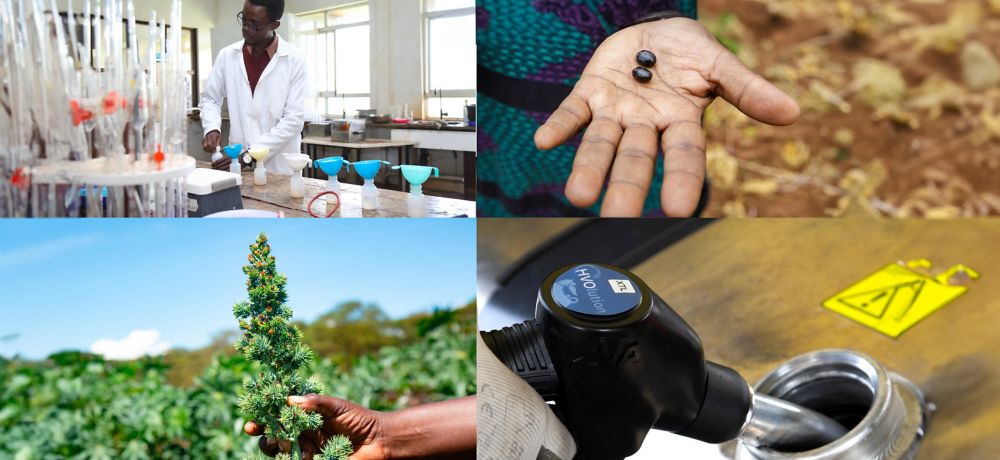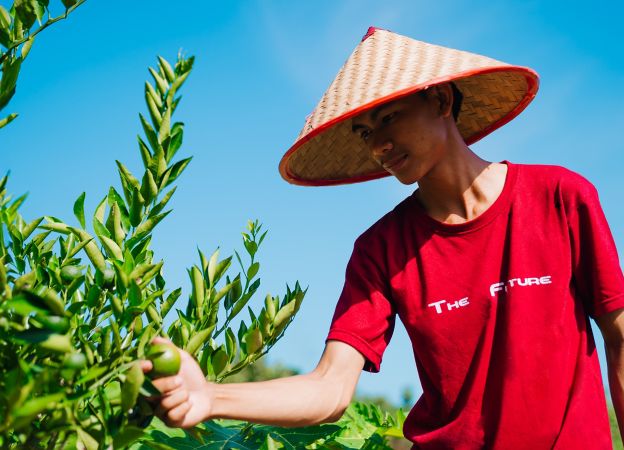1.7 mln
boe/d
daily production hydrocarbon

Or , our new artificial intelligence tool.
Increasing production capacity in bioenergy, particularly in biofuels and biomethane, contributes to achieving the Net Zero target.

We are present in the bioenergy sector with investments in the production of biofuels and biomethane, which is increasingly obtained from scrap and waste. Eni produces biofuels from various raw materials. Today our biorefineries are fed mostly by waste raw materials resulting from used cooking oil, animal fat and other biomass, which allows us to produce Hydrotreated Vegetable Oil (HVO) biofuels capable of reducing CO2eq emissions, depending on the feedstock used, by between 60 and 90% (calculated over the entire value chain) compared to the reference fossil mix, pursuant to the "RED" Directive for the promotion of energy from renewable sources. Eni stopped supplying palm oil to its Venice and Gela biorefineries as early as October 2022.
Through Enilive, we manage biorefining operations, the production of biomethane, and all smart mobility solutions such as the Enjoy car sharing service. We also oversee the marketing and distribution of all types of fuel for mobility, also through our Enilive Stations across Europe.
total biorefining capacity in 2024 (mln ton/y)
(million tonnes/year) total biorefining capacity by 2028
total biorefining capacity by 2030
With low-carbon production technologies and methods, we produce fuels that contribute to reducing emissions in transport.


Highlights Full Year 2024
daily production hydrocarbon
adjusted cash flow
proforma adjusted EBIT
leverage proforma
Our leading biofuel for transport is HVO (Hydrotreated Vegetable Oil), produced from renewable feedstocks, primarily waste and residues, at our biorefineries in Venice and Gela, Italy, and Chalmette, USA, using the EcofiningTM technology. HVO can be used in its pure form in all compatible diesel engines and is sold under the name HVOlution at Enilive service stations. Additionally, HVO is blended at 15% in Eni Diesel+.
We are developing initiatives to support the energy transition and decarbonization of the shipbuilding and maritime sectors through the production and sale of HVO biofuel and other energy fuels, such as hydrogen and “blue” or “green” ammonia derived from biogenic, renewable or waste feedstocks. Since 2023, we have partnered with shipowners’ associations in the initiative “The Route to Net Zero: Together to Decarbonize the Maritime Transport”. This initiative enables compliance with the targets set by the FuelEU Maritime Regulation, the International Maritime Organization (IMO), the Emission Trading System (ETS), and other measures to advance the decarbonization of the sector.
To contribute to the decarbonization of air transport, Enilive produces and markets Sustainable Aviation Fuels (SAFs). In this sector, Enilive has made agreements with ITA, DHL, Kenya Airways and Ryanair.
Produced from renewable raw materials, our biofuel contributes to accelerating the energy transition in the sector.

Chief Executive Officer of Eni

To ensure an increasingly sustainable supply for our biorefineries, we have developed a vertical integration model for cultivation and seed pressing projects in various countries for the production of vegetable oils (agrifeedstock), with the aim of reaching over 700,000 tonnes by 2027, corresponding to more than 35% of the feedstock processed in Italian biorefineries.
Through an agri-feedstock project: we are coordinating the cultivation of non-food plants on land identified as degraded by the local authorities and promoting the introduction of second-harvest crops, regenerative agriculture projects aimed at competing neither with food production nor with forest resources in some African countries, such as Mozambique. In the same countries, we co-ordinate the collection of waste materials, which are useful for producing biofuel, from agriculture, livestock breeding and the agri-food, catering and tourism industry. The products are collected in a network of "agri-hubs" and are then processed in our biorefineries and contribute to the production of HVO biofuels, initially with a limited role but then increasingly important.
In addition to cultivation, each of these projects envisages the creation of a centre for pressing crops and producing oil, as well as activating a series of services for farmers such as access to mechanisation, the distribution of seeds and fertilisers, training and technical assistance. The model provides that processing by-products are also exploited and transformed into feed for livestock or fertilisers for soil, contributing to the improvement of agricultural production for the domestic market. The regeneration of land thanks to the cultivation of biomass also contributes to the socio-economic development of the area. Farmers are actually fully in charge of the agricultural production at the agri-hubs. Through this model, we ensure that farmers can bring their products into the market without compromising land access.
target for produced agrifeedstock by 2027 in different countries
to benefit from agri-hubs in Kenya by 2030
A photobook documents the involvement of local farmers in the production of bio-oils, which are used as raw materials for biofuels.

Visit the agri-feedstock projects that contribute to the increasingly sustainable supply of our biorefineries.

We involve our suppliers in the development of new technologies to extract vegetable oil and produce fertiliser and fuel to be then used in agri-hubs.
In the bioenergy sector, we are also active in the production of biomethane through the company Enibioch4in. Due to it also being obtained from organic, agricultural and livestock waste according to the principles of the circular economy, this fuel can be used to produce electricity from renewable sources, distributed for domestic heating or used as fuel for transport, helping to expand our range of solutions for more sustainable mobility.
installations for generating electricity from biomethane
waste treatment plant
biomethane we aim to feed into the grid
I luoghi e le persone di Eni raccontano le tecnologie chiave della transizione - Segui Davide Campagna e Gabriella Greison alla scoperta dei biocarburanti nella bioraffineria di Venezia.
15 May 2024

If you want to change topic, clear the chat and make a new query to receive more relevant results.
This will delete the question history.
If you want to change topic, clear the chat and make a new query to receive more relevant results. This will delete the question history.
Here you can find the full list of your queries.
The answers are generated by artificial intelligence, therefore they may contain inaccuracies. Please read the terms and conditions of use.

EnergIA is an innovative tool based on artificial intelligence capabilities, which can help you navigate the contents of eni.com, quickly finding answers to your questions. EnergIA can also perform a search on a specific topic, providing the most up-to-date data available, or it can invite you to delve deeper into a topic of your interest by suggesting links and specific readings. Start now!
EnergIA is an innovative tool based on artificial intelligence capabilities, which can help you navigate the contents of eni.com, quickly finding answers to your questions. Start now!
EnergIA (ener'dʒia) is a system based on Generative Artificial Intelligence.
Thanks to this technology, we can respond to your requests by querying the most relevant content and documents available on eni.com. (Note: financial documents from the last 12 months and press releases from the last 2 years are considered.)
Through EnergIA, you can delve into topics of interest and have a real-time window into the world of Eni.
If you wish to search for a specific document, press release or news, use the traditional search engine via the magnifying glass icon.
Like all systems that leverage Generative Artificial Intelligence, EnergIA may generate inaccurate or outdated responses. Always consult the sources that EnergIA proposes as the origin of the generated information.
If the system fails to find an exact match for the requested content, it still tends to provide a response.
If you find any inaccuracies in the provided response, please send us your feedback at the bottom of the page: it will be very helpful for us to improve.
Remember that the content generated by the system does not represent Eni’s official position. We therefore invite stakeholders to refer to their designated contacts for official statements: Press Office for journalists, Investor Relations for analysts and investors, Company Secretariat for shareholders etc..
EnergIA can understand questions posed in almost all languages, but we prefer to provide you with a response in English or Italian, the two languages available on eni.com. If you ask a question in Italian, the content on the site in Italian will be consulted. If you ask it in English or any other language, the content in English will be consulted. (Note: the language Eni uses for financial documents/content is predominantly English.)
If questions are formulated that violate the set security criteria, the system will not proceed with processing the response. Please remember not to send personal data.
By using this service, the users acknowledge that they have read and accepted the terms and conditions of use.
Search
EnergIA (ener'dʒia) is a system based on Generative Artificial Intelligence.
Thanks to this technology, we can respond to your requests by querying the most relevant content and documents available on eni.com. (Note: financial documents from the last 12 months and press releases from the last 2 years are considered.)
Through EnergIA, you can delve into topics of interest and have a real-time window into the world of Eni.
If you wish to search for a specific document, press release or news, use the traditional search engine via the magnifying glass icon.
Like all systems that leverage Generative Artificial Intelligence, EnergIA may generate inaccurate or outdated responses. Always consult the sources that EnergIA proposes as the origin of the generated information.
If the system fails to find an exact match for the requested content, it still tends to provide a response.
If you find any inaccuracies in the provided response, please send us your feedback at the bottom of the page: it will be very helpful for us to improve.
Remember that the content generated by the system does not represent Eni’s official position. We therefore invite stakeholders to refer to their designated contacts for official statements: Press Office for journalists, Investor Relations for analysts and investors, Company Secretariat for shareholders etc..
EnergIA can understand questions posed in almost all languages, but we prefer to provide you with a response in English or Italian, the two languages available on eni.com. If you ask a question in Italian, the content on the site in Italian will be consulted. If you ask it in English or any other language, the content in English will be consulted. (Note: the language Eni uses for financial documents/content is predominantly English.)
If questions are formulated that violate the set security criteria, the system will not proceed with processing the response. Please remember not to send personal data.
By using this service, the users acknowledge that they have read and accepted the terms and conditions of use.
A new window into Eni’s world, at your disposal. EnergIA is an innovative tool based on artificial intelligence capabilities, which can help you navigate the contents of eni.com, quickly finding answers to your questions.



